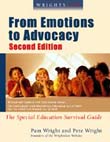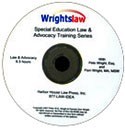State academic standards tell you what a child should know and be able to do in each grade - what the school should be teaching each child, including children with disabilities.
For a child with a disability, unless there is an evaluation stating that a child has a significant cognitive disability and is not able to learn grade level material, the IEP team must develop a plan of specialized instruction to teach the material in the academic content standards to your child.
What do you know about your state's academic standards?
Are they "...clear, specific, content-focused standards that define what students are expected to learn in every grade or course in English, math, science and social studies..?"
The latest review of state standards from the American Federation of Teachers found that 35 states have inferior standards overall, including seven that lack clear standards for any grade or subject—Colorado, Illinois, Iowa, Montana, Nebraska, Pennsylvania and Wisconsin.
Faring almost as poorly is a second group of states that meet the AFT's criteria in fewer than 25 percent of grades and subjects—Maine, New Hampshire, Rhode Island, New Jersey, Vermont and Wyoming.
Read the complete report, "Sizing Up State Standards, 2008", to find out if your state standards are strong or weak.
"Well-written grade-by-grade or course-by-course standards are critical because they drive curriculum, professional development, instruction and assessments, and provide guidance to textbook publishers."
Your child's IEP must include "a statement of the special education and related services and supplementary aides and services, based on peer-reviewed research to the extent practicable, to be provided to the child or on behalf of the child to enable the child to be involved in and make progress in the general education curriculum ..." 20 U.S.C. 1414(d).
These academic content standards define the "general education curriculum" that Congress said your child should be involved in and make progress in.
Get a copy of your state's academic standards.
Go to the website of your state department of education. Download your state's academic content standards. Your state may refer to them as "academic standards" or "grade level expectations" or "curriculum frameworks."
Print the academic standards for the grade your child will attend next year. You will be able to use the academic standards and information from current evaluations of your child to write appropriate, measurable IEP goals for the upcoming year.
Read this article, Your Child's IEP & Progress in the General Education Curriculum, from advocate Sue Whitney Heath. You'll learn more about how to use state standards to develop your child's IEP.
|








